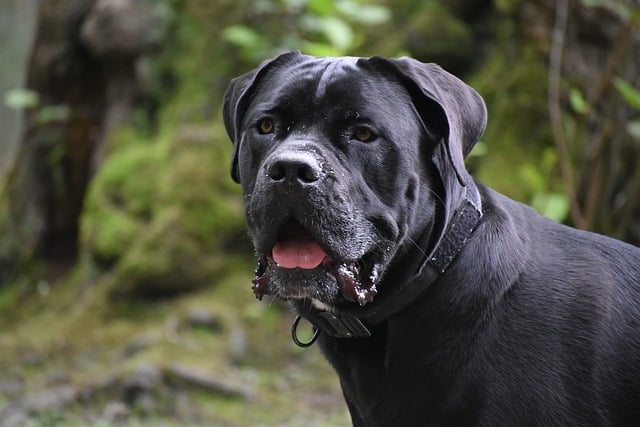


The Cane Corso is a large, powerful dog breed known for its protective nature and loyalty. Originally bred in Italy as a working dog, the Cane Corso is often used for guarding, herding, and even hunting large game. With a muscular build and strong instincts, this breed excels as a guard dog and family protector. While Cane Corsos are known for their assertiveness, they are also affectionate and devoted to their family members. This breed requires proper training, socialization, and physical activity to thrive, making them best suited for experienced dog owners who can provide firm leadership and structure.
The Cane Corso has a long history dating back to ancient Rome, where it was used for a variety of tasks, including guarding livestock, protecting property, and assisting in hunting large game such as wild boar. The breed's name, "Cane Corso," is derived from the Latin word "Cohors," meaning "protector" or "guardian." During the Middle Ages, the Cane Corso was used in Italy for herding and as a guard dog, particularly in rural areas. However, by the 20th century, the breed had nearly disappeared due to the industrialization of farming and the decline in the need for working dogs. The Cane Corso was revived in the 1980s through selective breeding efforts and is now recognized by kennel clubs worldwide, including the American Kennel Club (AKC).
The Cane Corso is a large and robust dog, with males standing between 25 to 28 inches (64 to 71 cm) at the shoulder and females ranging from 23 to 26 inches (60 to 66 cm). Their weight typically ranges from 90 to 120 pounds (41 to 54 kg), with males being larger than females. The breed has a muscular, athletic build, designed for strength and endurance. The Cane Corso’s coat is short, dense, and typically comes in a variety of colors, including black, fawn, gray, and brindle. The breed's head is large and broad, with a square-shaped muzzle and a strong jaw. The ears are often cropped in some countries, although this practice is becoming less common. Its eyes are dark and expressive, giving the Cane Corso a confident, alert expression. The tail is naturally thick at the base and tapers to a point, often carried in a slight curve.
The Cane Corso is known for its protective, confident, and intelligent nature. While it is a loyal and affectionate companion to its family, it can be reserved and cautious around strangers, making it an excellent guard dog. The breed is highly protective of its home and loved ones and will not hesitate to defend them if it senses a threat. Despite its strong guarding instincts, the Cane Corso is not aggressive by nature and can be a loving, calm pet when properly trained and socialized. Early socialization is crucial to ensure that the Cane Corso learns to distinguish between friend and foe. This breed is typically good with children and other pets, though its protective instincts may cause it to be wary of unfamiliar animals or situations.
The Cane Corso is a highly active breed with significant exercise needs. Due to its history as a working dog, it requires daily physical activity to stay healthy and happy. Regular exercise, such as long walks, jogs, or runs, is essential for the Cane Corso to burn off energy and maintain its muscular build. This breed also enjoys engaging in activities that challenge its mind, such as obedience training or canine sports. While the Cane Corso can adapt to living in a variety of environments, it thrives in homes with large yards or access to outdoor spaces where it can run and play. If the Cane Corso does not get enough physical or mental stimulation, it may become bored or exhibit undesirable behaviors, such as chewing or digging.
The Cane Corso is an intelligent and trainable breed, but it can be strong-willed and independent at times. Consistent, positive reinforcement training works best with this breed, as harsh methods may cause it to become stubborn or defensive. Early socialization is essential to help the Cane Corso become well-adjusted around other dogs, animals, and people. Socializing from a young age will help reduce its natural tendency to be overly protective or territorial. Obedience training should be started early, and it is important to establish firm but fair leadership to ensure that the Cane Corso respects its owner. This breed responds well to structured activities that engage both its mind and body.
The Cane Corso is generally a healthy breed, but like all dogs, it is susceptible to certain health issues. Some common conditions include hip dysplasia, elbow dysplasia, and bloat (gastric dilatation volvulus). Regular veterinary check-ups, a balanced diet, and proper exercise are important for maintaining the Cane Corso’s health. Due to its large size, the Cane Corso can be prone to joint issues, particularly as it ages, so it is important to monitor its weight and ensure that it gets adequate joint care. The Cane Corso’s short coat is relatively easy to maintain, requiring only occasional brushing to remove loose hair. Regular ear cleaning, dental care, and nail trimming should also be part of the breed’s routine care regimen.
The Cane Corso typically has a lifespan of 9 to 12 years. While this is relatively short compared to smaller breeds, it can live a long and healthy life with proper care. Regular exercise, a balanced diet, and routine veterinary care can help extend the Cane Corso’s lifespan. As the breed ages, it may become more prone to conditions such as arthritis or hip dysplasia, so it is important to monitor its health and provide support as needed. Regular check-ups and early detection of health issues are essential for keeping the Cane Corso comfortable in its senior years.
© copyright Dog Compendium 2024 - 2026